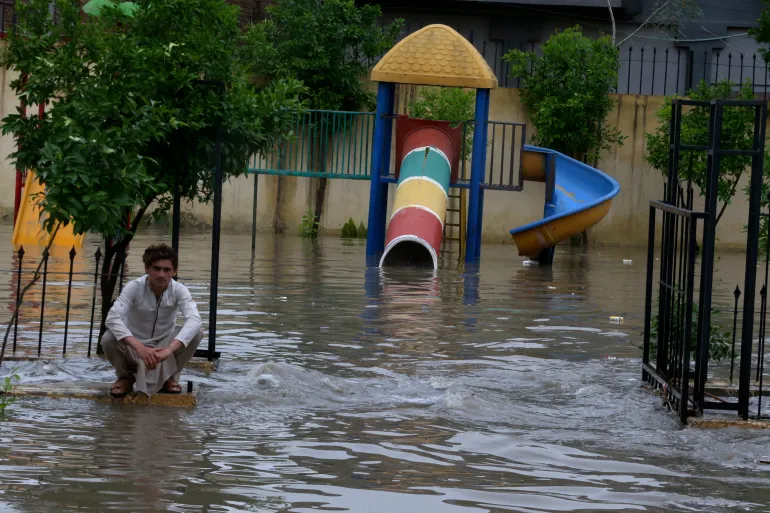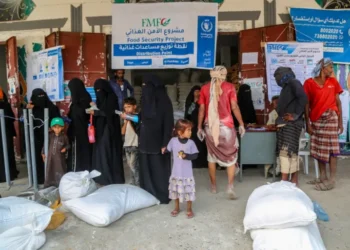The Chinese government has issued its highest-level rainstorm warning and evacuated more than 100,000 people as rain continues to hit the south of the country.
Beijing raised the alert on Tuesday as ongoing storms threatened to worsen already massive flooding in Guangdong province. Four people were reported killed over the weekend, while 10 others are missing.
Torrential rains have lashed Guangdong in recent days, prompting state media to warn of the risk of floods at a level “seen around once a century”.
Footage from across Guangdong showed flooded villages, farmland and cities, along with collapsed bridges and floating vehicles.
State news agency said that 110,000 residents across the province had been relocated since the downpours started.
In addition to the 110,000 people who have been evacuated, at least 25,000 are in emergency shelters.
In the provincial capital, Guangzhou, authorities have registered cumulative rainfall of 609mm in April so far, which is already the highest monthly volume since record-keeping began in 1959.
On Tuesday, the megacity of Shenzhen was among the areas listed as experiencing “heavy to very heavy downpours”, the city’s meteorological observatory said, adding the risk of flash floods was “very high”.
Heavy rain is expected to continue in Shenzhen for the next two to three hours, authorities said.
Images from Qingyuan—a city in northern Guangdong that is part of the low-lying Pearl River Delta—showed a building almost completely submerged in a flooded park next to a river.

Climate change driven by human-emitted greenhouse gases makes extreme weather events more frequent and intense. China is the world’s biggest emitter.
In recent years China has been hit by severe floods, grinding droughts and record heat.
That has helped make the authorities swift to respond, lowering the number of casualties compared with previous decades.
Asia Most Affected By Climate Change

Also on Tuesday, the World Meteorological Organization (WMO) stated in a report that Asia was the region most affected by climate change, weather and water-related hazards globally last year.
In the report, the United Nations weather agency said that floods and storms were the main cause of casualties and economic damage in 2023, while the impact of heatwaves became more severe.
The State of the Climate in Asia 2023 report also found that floods were the leading cause of death in reported events in 2023 “by a substantial margin.”
It found that Asia has been warming faster than the global average, with temperature rises in 2023 averaging nearly 2 degrees Celsius (3.6 degrees Fahrenheit) above the 1961-90 average.
“Many countries in the region experienced their hottest year on record in 2023, along with a barrage of extreme conditions, from droughts and heatwaves to floods and storms,” WMO Chief, Celeste Saulo said in a statement.
She added that climate change “exacerbated the frequency and severity of such events,” calling the report’s conclusions “sobering.”
According to WMO, 79 disasters associated with water-related weather hazards were reported in Asia last year. Of those, about 80 percent were floods and storms, with more than 2,000 deaths and nine million people directly affected.
The report also highlighted that most glaciers in the high mountain region in Asia had lost significant mass because of record-breaking high temperatures and dry condition
Particularly high average temperatures were recorded from western Siberia to Central Asia, and from eastern China to Japan, the report said, with Japan having its hottest summer on record.
The WMO said that there was an urgent need for national weather services across Asia to improve tailored information to officials working on reducing disaster risks.
“It is imperative that our actions and strategies mirror the urgency of these times,” Saulo noted.
The WMO Chief added, “Reducing greenhouse gas emissions and adapting to the evolving climate is not merely an option, but a fundamental necessity.”
READ ALSO: Ghana’s Economy, On Paper vs. In Your Pocket























